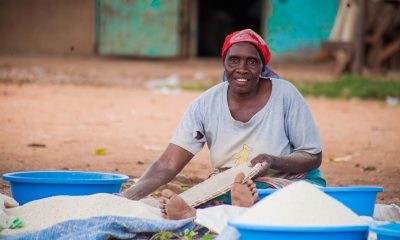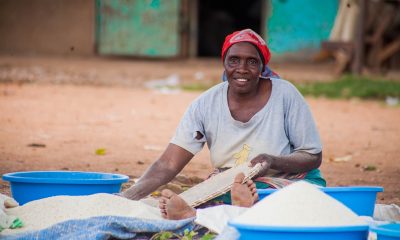Africa
Global Economic Growth in 2024: Eleven African Countries in the Top 20, According to AfDB Report
The African Development Bank (AfDB) has released its report entitled “Africa’s Macroeconomic Performance and Prospects.” Published on February 18th, 2024, in Addis Ababa, the document provides an updated, evidence-based assessment of the continent’s recent macroeconomic performance and short- and medium-term prospects amid dynamic developments in the global economy.

According to the new AfDB report, in 2024 Africa will have eleven of the twenty countries with the strongest economic growth in the world. Among these eleven African countries expected to experience strong economic performance in 2024 are Niger (11.2%), Senegal (8.2%), Libya (7.9%), Rwanda (7. 2%), Ivory Coast (6.8%), Ethiopia (6.7%), Benin (6.4%), Djibouti (6.2%), Tanzania (6.1%) ), Togo (6%), and Uganda (6%).
The continent’s real gross domestic product (GDP) growth projection is estimated at 3.8% this year and 4.2% in 2025, higher than global forecasts of 2.9% and 3.2%, on average. The report further revealed that Africa is expected to remain the second fastest growing region after Asia.
The growth of the most successful African economies results from certain factors. According to the chief economist and vice-president of the African Development Bank group, Kevin Urama, these are the reduction of dependence on raw materials through economic diversification, the increase in strategic investments in key growth sectors, rising public and private consumption, as well as positive developments in key export markets.
Read more about the global economic growth and find the most important economic news of the day with our companion app Born2Invest.
In short, in 2024, around forty countries on the continent will achieve an economic growth rate of 3.8%
Growth will be more than one percentage point higher than in 2023 in thirteen of the 41 countries.
However, the recovery and continued resilience of African economies in the medium term comes with cautious optimism, given the challenges posed by global and regional risks. These risks include rising geopolitical tensions, increased regional conflicts and political instability, which could disrupt trade and investment flows and maintain inflationary pressures. To address existing and emerging threats, the report recommends countries to invest more in human capital and pursue a resource-based industrialization and diversification strategy that allows the continent to exploit its comparative advantages and strengthen its resilience to shocks.
“The future of Africa rests on economic integration. Our small economies are not competitive in the global market. A healthy African internal market can ensure intra-African production of value-added manufactured products,” declared Ambassador Albert Muchanga, Commissioner for Economic Development, Trade, Tourism, Industry and minerals of the African Union Commission, upon publication of the report.
For the director of the Center for Sustainable Development at Columbia University in New York, Effrey Sachs, affordable long-term financing must be part of Africa’s strategy to achieve growth of 7% or more per year. He also warned of the fact that Africa was paying a very high risk premium to finance its debt, while asking that this issue be brought to the attention of the G20.
“Long-term development cannot be based on short-term loans. Loans granted to Africa should have a duration of at least 25 years, if not longer. Short-term borrowing is dangerous for long-term development. Africa must act as one, on a large scale,” he explained.
Overview of economic growth prospects in different regions
Despite the confluence of shocks, the resilience of the continent’s economies remains strong, with positive economic growth forecast for all five regions of the continent.
East Africa – East Africa will continue to drive the continent’s growth momentum, with GDP growth forecast at 5.1% in 2024 and 5.7% in 2025, supported by strong strategic investments aimed at improving internal connectivity and deepening intra-regional trade.
North Africa – Continued adverse weather conditions and macroeconomic challenges will keep the region’s growth at 3.9% in 2024, with a slight improvement to 4.1% in 2025.
Central Africa – Economic growth is expected to slow to 3.5% in 2024, but the expected recovery in private consumption and increased mining investment and exports could help lift growth to 4.1% in 2025.
Southern Africa – Economic growth will remain weak, increasing by 2.2% in 2024 and 2.6% in 2025. This reflects the continued economic weakness of South Africa, the region’s largest economy.
West Africa – Economic growth is expected to accelerate to 4% in 2024 and 4.4% in 2025. Strong growth in most countries in the region is expected to offset slowdowns in Nigeria and Ghana. The announced withdrawal of Burkina Faso, Mali and Niger from the Economic Community of West African States (ECOWAS) casts a shadow over the sustainability of gains amid growing uncertainty.
__
(Featured image by Chris Liverani via Unsplash)
DISCLAIMER: This article was written by a third party contributor and does not reflect the opinion of Born2Invest, its management, staff or its associates. Please review our disclaimer for more information.
This article may include forward-looking statements. These forward-looking statements generally are identified by the words “believe,” “project,” “estimate,” “become,” “plan,” “will,” and similar expressions. These forward-looking statements involve known and unknown risks as well as uncertainties, including those discussed in the following cautionary statements and elsewhere in this article and on this site. Although the Company may believe that its expectations are based on reasonable assumptions, the actual results that the Company may achieve may differ materially from any forward-looking statements, which reflect the opinions of the management of the Company only as of the date hereof. Additionally, please make sure to read these important disclosures.
First published in le faso.net. A third-party contributor translated and adapted the article from the original. In case of discrepancy, the original will prevail.
Although we made reasonable efforts to provide accurate translations, some parts may be incorrect. Born2Invest assumes no responsibility for errors, omissions or ambiguities in the translations provided on this website. Any person or entity relying on translated content does so at their own risk. Born2Invest is not responsible for losses caused by such reliance on the accuracy or reliability of translated information. If you wish to report an error or inaccuracy in the translation, we encourage you to contact us

-

 Crypto1 week ago
Crypto1 week agoXRP vs. Litecoin: The Race for the Next Crypto ETF Heats Up
-

 Biotech5 days ago
Biotech5 days agoSpain Invests €126.9M in Groundbreaking EU Health Innovation Project Med4Cure
-

 Crypto2 weeks ago
Crypto2 weeks agoRipple Launches EVM Sidechain to Boost XRP in DeFi
-

 Biotech1 day ago
Biotech1 day agoAdvancing Sarcoma Treatment: CAR-T Cell Therapy Offers Hope for Rare Tumors
























